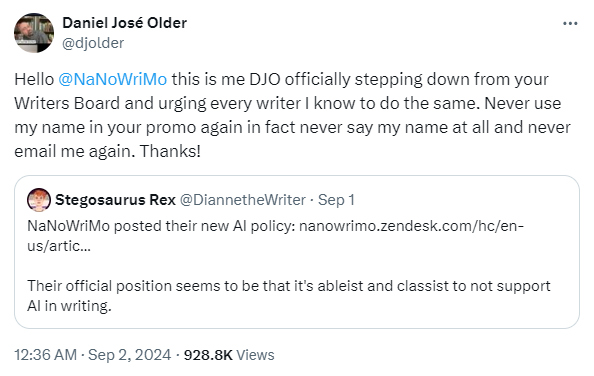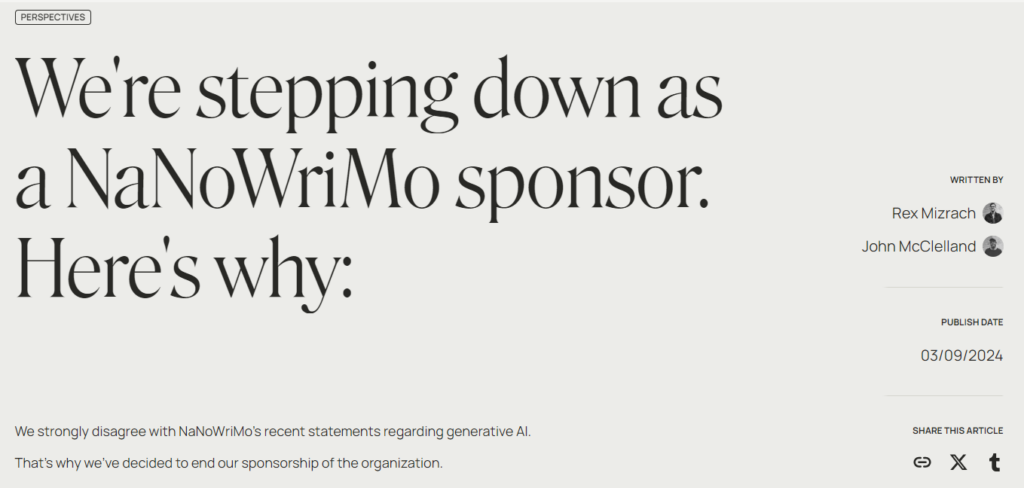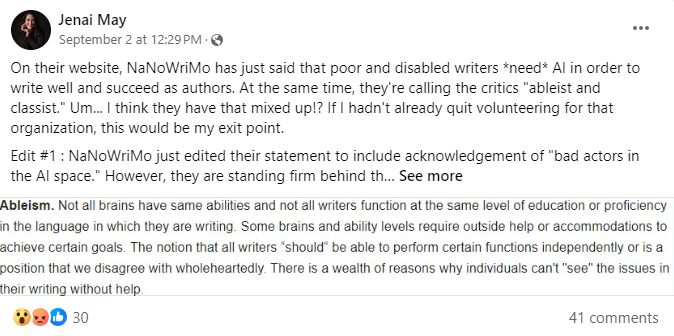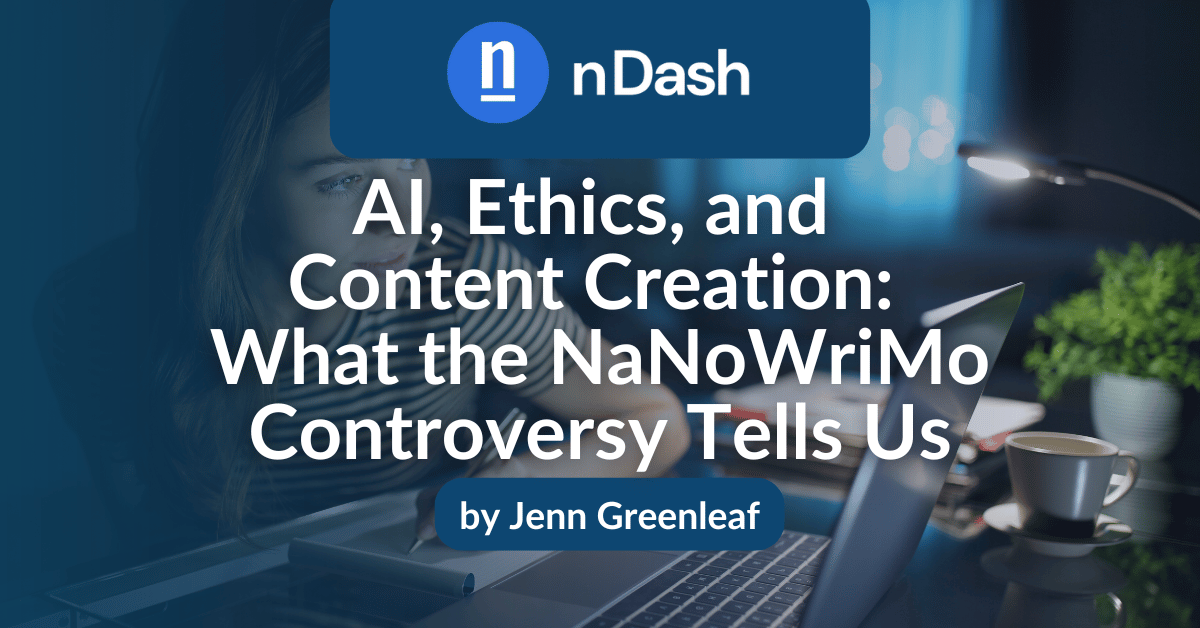NaNoWriMo’s recent AI statement has ignited a significant debate within the writing community, raising questions about the ethics and future of AI in content creation processes.
NaNoWriMo’s Controversial Stance on AI and Content Creation
NaNoWriMo (National Novel Writing Month) is an annual writing challenge held in November. It provides aspiring and experienced writers with an opportunity to produce a 50,000-word “ugly” manuscript. Since 1999, the organization has been known for fostering creativity and encouraging community-based writing.
However, its recent statement on artificial intelligence (AI) ignited a significant debate. Released through a secondary platform, NaNoWriMo claimed that opposing AI tools in writing is inherently classist and ableist. This sparked a backlash from participants and prominent writers, dividing the community over AI’s role in creative writing.
Please note that, since releasing its original statement, the site has since made some changes to it, as indicated in Mignon Fogarty’s update on the matter:
“For example, it included a bullet point about some writers not being able to afford to hire professionals to get feedback on their writing, which therefore makes opposition to using AI for feedback classist.”
NaNoWriMo’s AI Statement: The Core of the Controversy
NaNoWriMo’s AI statement stirred the writing community by framing opposition to AI as having “classist and ableist undertones.” The organization argued that rejecting AI ignores the barriers some writers face, such as disabilities or financial challenges, where AI could be seen as an accessible tool for overcoming these obstacles.
Treasa Edmond, Content Strategist and Writer, shares her thoughts on the matter. “The statement from NaNoWriMo is tone-deaf, and it completely undermines everything I’ve ever believed about the writing challenge. They use phrases like ‘assumes a level of privilege’ and ‘not all brains have [the] same abilities’ when neither has any bearing on whether AI should play a role in a writing challenge.”
She continues, “While I agree that not all brains have the same abilities, AI doesn’t support ability. The statement seems to confuse assistive technology with AI. Assistive technology facilitates the process, but the individual does the creation. AI is a shortcut. It does the work for the individual. That removes creativity from the process; isn’t the ‘creative process’ the point of NaNoWriMo?”
This argument did not sit well with many, who saw it as an inappropriate use of social justice language to defend AI technology. Furthermore, the statement was published on NaNoWriMo’s Zendesk page—an unconventional and less visible platform—further fueling confusion about the nonprofit’s true stance on the issue.
Immediate Fallout and Resignations
The fallout from NaNoWriMo’s AI stance was swift and significant. Several members of the organization’s Writers Board resigned in protest, including well-known authors Daniel José Older and Cass Morris, both of whom publicly voiced their strong disapproval of the statement. Older described the position as “vile” and “unconscionable,” while Morris severed ties, including deleting her NaNoWriMo account.

Additionally, one of NaNoWriMo’s key sponsors, Ellipsus, a company opposed to generative AI, also withdrew its support in response. This marked a serious fracture within the organization and the larger writing community.

Kara Detwiller, Freelance Content Writer, states, “The AI issue is complex and divisive, and NaNoWriMo was likely to get some backlash no matter what they said about it.”
She continues, “However, their decision to accuse AI critics of classism and ableism is a decision to alienate all writers with valid concerns about dubious AI scraping practices, plagiarism, and creative integrity. The fact that one of their sponsors is a generative AI writing tool makes it even more sketchy.”
Social and Ethical Implications of Using AI for Content Creation
The growing role of AI in content creation brings both opportunities and ethical concerns. On the one hand, AI tools have proven effective for ideation, rough drafts, summarizing information, and other internal processes, as highlighted in the nDash article.
These tools can enhance productivity by helping marketers and writers outline ideas and create non-client-facing content quickly. However, this growing reliance on AI raises questions about its ethical and social implications, particularly regarding issues of classism, ableism, and the future of human creativity.
Classism and Ableism: Misused or Justified?
NaNoWriMo’s AI stance argues that rejecting AI tools overlooks the benefits they provide to marginalized writers, framing opposition to AI as classist and ableist. However, many see this argument as a misuse of social justice language to defend a controversial position.
While AI does offer accessibility advantages for users with disabilities or limited resources, the debate centers on whether this defense is valid. Comparatively, discussions around AI copywriting tools emphasize that they offer efficiency and accessibility but should be carefully monitored to prevent overreliance.
The Broader Ethical Concerns with AI in Content Creation
Wider ethical concerns surround AI’s impact on content creation, particularly issues of plagiarism and the erosion of human creativity. AI-generated content is often seen as impersonal, raising worries that overuse could lead to a diminished creative experience.
Although AI is beneficial for tasks like brainstorming and outlining, it lacks the emotional depth and “human touch” that make writing resonate with audiences. These tools are useful for streamlining processes, but final drafts must be human-crafted to ensure authenticity, originality, and connection with readers.
Community Reactions: Division in the Writing and Content Creation World
NaNoWriMo, once a beacon of creativity, is now sharply divided over the use of AI in writing. What was once a united community is now split between those who see AI as a helpful tool and others who view it as a threat to the integrity of human creativity. This mirrors discussions in marketing and writing, as seen in the nDash article, where AI tools are praised for their efficiency but still raise concerns about replacing human input and emotional depth.
The Longtime Participants: Shock and Betrayal
Longtime NaNoWriMo participants like Jenai May expressed deep feelings of betrayal after the organization’s stance on AI was made public. May, a veteran NaNo participant and volunteer leader, voiced her shock over NaNoWriMo’s suggestion that AI could aid disadvantaged or disabled writers.

This mirrors the concerns many writers and marketers have about AI-generated content taking over human-created work. The fear of losing authenticity and human voice is widespread, leading many to reject the use of AI for client-facing or final content creation.
The Digital Generation’s Perspective
Rebecca Thorne’s viral TikTok critique highlighted how AI has become a point of contention for younger NaNoWriMo participants. Thorne argued that NaNoWriMo’s endorsement of AI undermines the event’s community-driven purpose, which thrives on human connections. In the marketing world, younger generations are embracing AI for efficiency and personalization.
@rebecca.thorne For anyone who doesn’t have a whisper network… #nanowrimo isn’t doing so hot. I’m grateful for the Board of Directors taking swift action. I’m apalled it took them to respond. Now is the time to change your password, your email, and check your kids if they’ve been on these forums. 😬 #writertok #authortok #booktok #book #fyp #nationalnovelwritingmonth ♬ original sound – Rebecca Thorne
Still, like Thorne, they emphasize that AI should be used for non-client-facing tasks like ideation and rough drafts to maintain authenticity in final products. This generational divide reflects larger industry trends, where AI’s utility is acknowledged, but its limits are carefully considered.
The Role of AI in the Future of Content Creation
The NaNoWriMo controversy and the rise of advanced AI copywriting tools highlight significant trends shaping the future of content creation. AI’s role in creative industries remains both promising and controversial.
AI for Non-Client-Facing Content Creation
While AI tools can streamline content creation, their best use lies in non-client-facing tasks. These include outlining, brainstorming ideas, summarizing complex details, and drafting rough content. AI lacks the nuance and emotional depth necessary for final deliverables, making it unsuitable for client-facing materials.
Human writers are crucial for ensuring that finished content resonates with audiences, maintains authenticity, and upholds quality standards. AI can be a powerful assistant for behind-the-scenes work, but human oversight is essential for delivering personalized, polished results.
Balancing Creativity with AI-Driven Efficiency
AI tools offer content marketing managers the opportunity to boost efficiency without sacrificing creativity. By automating repetitive or time-consuming tasks, AI can free up time for them to focus on strategic, high-level creative work that requires a personal touch.
For instance, AI can handle ideation, outlining, and data-driven insights. However, human involvement remains necessary to craft compelling stories that connect with audiences. The key is finding a balance between AI-driven efficiency and the unique creativity that only humans can provide.
How NaNoWriMo’s AI Controversy Might Shape the Future of Content Creation
The NaNoWriMo AI controversy highlights a growing divide about AI’s role in content creation. As AI advances, its use in non-client-facing tasks will likely increase. However, maintaining human-driven creativity in final products remains essential for quality and authenticity. The future of content creation depends on finding a balance between AI-driven efficiency and the irreplaceable value of human insight.
